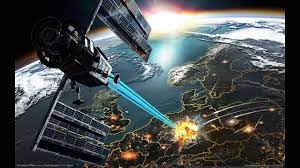Yes, Further militarisation of space should be allowed
Outer space is an environment that has long fascinated mankind, who have, from the dawn of time, tried to interpret its significance. We humans are, by nature, explorers, motivated by curiosity. This is a uniquely human quality. This insatiable curiosity is what drove explorers to prove the Earth is not flat and it is the same instincts that sends us to the stars at the speed of thought, urging us to go there in reality. And whenever we make a major breakthrough, we raise mankind, unite people and nations, and usher in new discoveries and technologies. We have an unlimited imagination, and should therefore keep making efforts to explore, research and develop new opportunities.
Since time immemorial, we have always tried to protect our territory by maintaining and sacrificing for it. Why? - Because national boundaries give identity to people. They are an essential tool for navigating the modern 21st century world. The key to keeping things peaceful in this unexplored field is to get the incentives right.
Suppose, some organization or rogue element poses a danger to the lives of humans on Earth, then, wouldn’t it be better to have support from the military positioned in space? They can help reduce the impact and even prevent mass destruction on Earth.
Weaponization is no doubt a subset of militarisation however, there is a subtle difference between the two. Militarisation of outer space is the use of space in support of ground, sea and air-based military operations. Today, militaries all over the world rely on satellites for command and control, communication and reconnaissance, early warning and navigation with the GPS.
Space is the ultimate high ground and will not be used as a new battlefield.
Taking a look back at 1945 during world war II : the mass destruction which had occurred in the cities of Hiroshima and Nagasaki, in Japan. Hiroshima was bombed by ‘Little Boy’ and Nagasaki by ‘Fat man’, which were nuclear weapons dropped by the U.S. If there would have been a defensive weapon positioned in space during that time, then maybe the face of this world would have been very different from what it is now. The military space force would have shot down the Boeing B-29 bomber, Enola Gay and lakhs of lives would have been saved. This is the power militarisation of space holds.
Giving an example of a world power, the United States of America; The country created a Space Force in 2019, the sixth branch of the US military. As laid out by the directives of the Pentagon, the goal of militarising U.S in space has two aims: defending the U.S. satellite fleet and developing a unified peaceful space theory. That is exactly what the primary mission of militarisation should be: to maintain, protect and form the backbone of countries' global military operations. Space forces are needed to consolidate responsibility for national security and therefore build a cadre of professionals who can build space-centric strategies. Having a specialized task force for space would fix the fragmented authorities and responsibilities for space because these extend beyond the Department of the Air Force.
Space is a shared resource, hence easier to protect through international cooperation. Orderly regulation of space militarization can help avoid a costly and potentially devastating arms race. If we don't establish order over there, Earth-bound conflicts may arise. The exploration and use of outer space shall be for peaceful purposes and be carried out in the interest of all countries, irrespective of their degree of economic or scientific development.
Most people are against militarisation because they feel that competition for territory in space can cause military conflict or war, however an extremely important concept comes into play in that situation.
At the dawn of the nuclear age, the concept of deterrence came on its own. This idea applies in space as well. In its most general form, the concept of deterrence is simply the persuasion of one’s opponent that the costs and risks of a given course of action outweigh any benefits. If all the countries stationed in space are militarised, it is illogical and practically impossible to go to war against each other in such a fragile environment, as both of them are equally armed. Therefore, the space deterrence seems to be an attractive tool for increasing the security of space assets.
While various policymakers are giving importance to militarization, they should also concentrate on confidence-building measures, transparency efforts and arms control agreements that can help us prevent future confrontations in more diverse dimensions of human activity.
To prevent crowding in space, an orbital-use fee or a tradeable permit can be used to guarantee safety. If the number of satellites reduce, so will the collisions. As a result, the issue of space debris will be solved, while also boosting the economy. The current number of unemployed people around the world is 205 million. We desperately need a new worthwhile sector of employment and militarization of space will do just that.
You must have heard about the recent testing of China’s hypersonic nuclear missile in space. There was a lot of speculation involved between the counterparts of China and other countries. Thankfully we have responsible countries and a well-reporting media, which helped identify the issue. This discussion is on the larger aspect of transparency and international relations, not related to the militarization in space.
It should not be a competition between countries. The whole of humanity should collectively create the environment in space. We are THE ONLY KNOWN species who can acquire it, so let us join hands to better the process, so that we at least have another place to take refuge.
Rogue elements are getting more tech savvy day by day, so anything which has potential to fall in wrong hands should be controlled by people who have noble intentions. If neutral agencies don't militarize space, insurgents will, which is when the aspect of weaponization can come in. We should attempt to regulate the destructive behavior of nations rather than attempting to limit their technology. It is HOW they use their technology that matters.
Space capabilities are already an indispensable part of the world’s military and the threats posed to humanity are growing day by day. We should not wait for another potentially life-threatening event to prove to us the need of the hour, i.e. militarization of space.
Views expressed are personal


Comments
Post a Comment